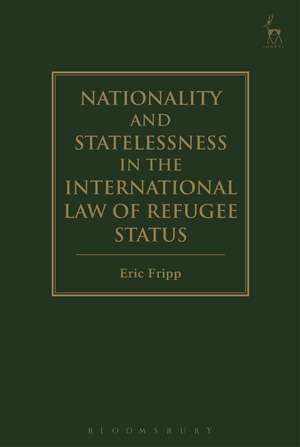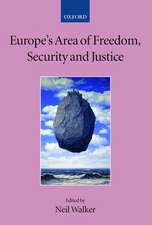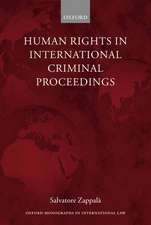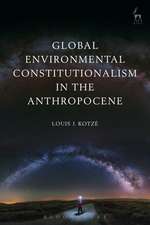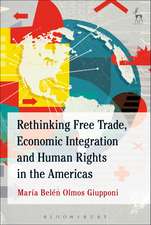Nationality and Statelessness in the International Law of Refugee Status
Autor Eric Frippen Limba Engleză Hardback – 21 sep 2016
Preț: 777.86 lei
Preț vechi: 1054.10 lei
-26% Nou
Puncte Express: 1167
Preț estimativ în valută:
148.86€ • 154.84$ • 122.89£
148.86€ • 154.84$ • 122.89£
Carte tipărită la comandă
Livrare economică 14-28 aprilie
Preluare comenzi: 021 569.72.76
Specificații
ISBN-13: 9781782259213
ISBN-10: 178225921X
Pagini: 416
Dimensiuni: 156 x 234 x 35 mm
Greutate: 0.75 kg
Editura: Bloomsbury Publishing
Colecția Hart Publishing
Locul publicării:London, United Kingdom
ISBN-10: 178225921X
Pagini: 416
Dimensiuni: 156 x 234 x 35 mm
Greutate: 0.75 kg
Editura: Bloomsbury Publishing
Colecția Hart Publishing
Locul publicării:London, United Kingdom
Caracteristici
In this book a leading practitioner explores the highly topical question of denationalisation.
Notă biografică
Eric Fripp is a barrister specialising in public, immigration and asylum law at Lamb Building, Temple.
Cuprins
Part I: Background1. Nationality, Citizenship, Statelessness 2. The Law of Refugee Status3. Interpretation Part II: Interpretation of Relevant Provisions4. Well-Founded Fear of Being Persecuted 'for Reasons of . Nationality' 5. Nationality and the Identifi cation of a Reference Country (or Countries6. Persecution by Denial of Nationality 7. Cessation 8. Exclusion
Recenzii
This is a work of careful and formidable scholarship.I have no doubt that this book was worth the enormous amount of effort and thought which has clearly been put into its production. It is an important and useful contribution in a field which daily becomes of more and more importance.This book.should be of interest to lawyers and legislators in the field all round the world.
This book is a signal addition to the learning. It tackles what has been a much neglected area of refugee law and sheds great light on almost every issue that has troubled commentators and decision makers since the Refugee Convention and its 1967 Protocol came into force. It uses an incisive survey of the international law treatment of the issue of nationality to look afresh at how that should inform determination of nationality for the purposes of the refugee definition. It is bound to become an essential reference point.
In this thoughtful and full exploration of refugee law, nationality and statelessness Eric Fripp explores some interesting and underdeveloped themes. Added to his earlier and excellent work from 2015, The Law and Practice of Expulsion and Exclusion from the United Kingdom, Eric is establishing himself as pre-eminent in this important and growing area of work. Nationality, citizenship and belonging are becoming increasingly important areas of contest between individuals and states.Globalisation is not so much eroding the system of nation-states as causing its resurgence, at least for the time being. We are experiencing something of a Counter-Reformation. Linked to that, some nation states are exploring the use of nationality and citizenship status to exclude unwanted or perceived undesirable residents from their territory or, failing that, at least to deprive them of their rights as citizens.Eric is at the forefront of exploring the legal context to this trend and his two works provide really useful analysis and material on this developing area of law.
This book is significant for current research for three reasons: Firstly, no other study gathers in such a meticulous way the developments in the international law of nationality and statelessness relevant to the scope of article 1 of the Refugee Convention. Secondly, it supports our understanding of the meaning of nationality and statelessness in the context of claims for refugee status and other claims for protection. Thirdly, it addresses the current challenge in refugee law to holistically approach the law which is not operating in isolation, but is influenced by other areas which are themselves subject to change. These three aspects are imperative to create a framework that is responsive to people in need. Fripp's research is stimulating and deserves readership from people in the field.
For a long time, the paths of refugees and stateless persons were seen to be separate ones. The former received more attention than the latter but, regardless, each had their own distinct international law regime. As interest in the issue of statelessness grew, from the 1990s onwards, great emphasis was placed on the fact that most people who are stateless have never crossed an international border and are not refugees - even if there was also acknowledgement of statelessness as a root cause of forced migration. The situation of the "stateless refugee" and the interaction between the frameworks of international refugee law and international statelessness law remained neglected subjects. Yet, there are many stateless refugees in the world today and many more refugees who may be at risk of statelessness. Moreover, as Fripp demonstrates, questions of nationality and statelessness can be directly relevant to the application of refugee law. So, not only must we do more to recognise and respond to the needs of stateless refugees, but we must also challenge the separation of the refugee law and statelessness law discourses. Fripp's meticulous and well-presented analysis on the implications of statelessness in a refugee law context provides an important contribution to such efforts.
Fripp's analysis of article 1 of the 1951 Convention in light of developments in international law related to nationality and statelessness generally is an outstanding contribution to scholarship on the scope of protection provided to refugees, especially the broad scope of case law covered. It is also a valuable contribution to scholarship on the international law of nationality generally... Fripp's presentation is imbued throughout with reminders of what is at stake for the lives of real persons... Fripp's background as a barrister in the United Kingdom no doubt informs his excellent application of cases to his analysis. His use of cases to illustrate his points and underpin his presentation of the issues is exemplary and eminently useful.
This book is a signal addition to the learning. It tackles what has been a much neglected area of refugee law and sheds great light on almost every issue that has troubled commentators and decision makers since the Refugee Convention and its 1967 Protocol came into force. It uses an incisive survey of the international law treatment of the issue of nationality to look afresh at how that should inform determination of nationality for the purposes of the refugee definition. It is bound to become an essential reference point.
In this thoughtful and full exploration of refugee law, nationality and statelessness Eric Fripp explores some interesting and underdeveloped themes. Added to his earlier and excellent work from 2015, The Law and Practice of Expulsion and Exclusion from the United Kingdom, Eric is establishing himself as pre-eminent in this important and growing area of work. Nationality, citizenship and belonging are becoming increasingly important areas of contest between individuals and states.Globalisation is not so much eroding the system of nation-states as causing its resurgence, at least for the time being. We are experiencing something of a Counter-Reformation. Linked to that, some nation states are exploring the use of nationality and citizenship status to exclude unwanted or perceived undesirable residents from their territory or, failing that, at least to deprive them of their rights as citizens.Eric is at the forefront of exploring the legal context to this trend and his two works provide really useful analysis and material on this developing area of law.
This book is significant for current research for three reasons: Firstly, no other study gathers in such a meticulous way the developments in the international law of nationality and statelessness relevant to the scope of article 1 of the Refugee Convention. Secondly, it supports our understanding of the meaning of nationality and statelessness in the context of claims for refugee status and other claims for protection. Thirdly, it addresses the current challenge in refugee law to holistically approach the law which is not operating in isolation, but is influenced by other areas which are themselves subject to change. These three aspects are imperative to create a framework that is responsive to people in need. Fripp's research is stimulating and deserves readership from people in the field.
For a long time, the paths of refugees and stateless persons were seen to be separate ones. The former received more attention than the latter but, regardless, each had their own distinct international law regime. As interest in the issue of statelessness grew, from the 1990s onwards, great emphasis was placed on the fact that most people who are stateless have never crossed an international border and are not refugees - even if there was also acknowledgement of statelessness as a root cause of forced migration. The situation of the "stateless refugee" and the interaction between the frameworks of international refugee law and international statelessness law remained neglected subjects. Yet, there are many stateless refugees in the world today and many more refugees who may be at risk of statelessness. Moreover, as Fripp demonstrates, questions of nationality and statelessness can be directly relevant to the application of refugee law. So, not only must we do more to recognise and respond to the needs of stateless refugees, but we must also challenge the separation of the refugee law and statelessness law discourses. Fripp's meticulous and well-presented analysis on the implications of statelessness in a refugee law context provides an important contribution to such efforts.
Fripp's analysis of article 1 of the 1951 Convention in light of developments in international law related to nationality and statelessness generally is an outstanding contribution to scholarship on the scope of protection provided to refugees, especially the broad scope of case law covered. It is also a valuable contribution to scholarship on the international law of nationality generally... Fripp's presentation is imbued throughout with reminders of what is at stake for the lives of real persons... Fripp's background as a barrister in the United Kingdom no doubt informs his excellent application of cases to his analysis. His use of cases to illustrate his points and underpin his presentation of the issues is exemplary and eminently useful.
